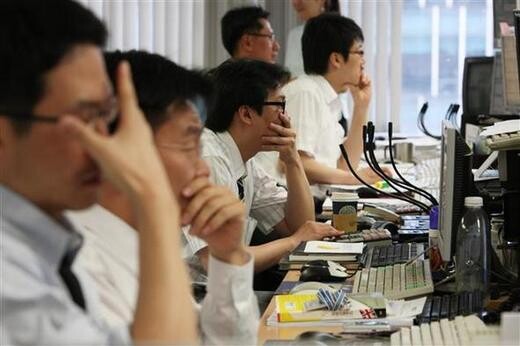hankyoreh
Links to other country sites 다른 나라 사이트 링크
Raw materials price hikes present serious problem for S. Korea

The price hike for steel and petrochemical products has become a more serious problem for Korea than for other countries. Korea lacks natural sources of these and other raw materials, which are essential for use in various industries. The nation has also witnessed a higher rate of growth in wheat flour prices than many major cities worldwide.
The seriousness of Korea’s situation was confirmed via a survey of the prices for raw materials and food found in eight major cities in Germany, the United States, Vietnam, Argentina, England, Japan, China and Korea. The survey was conducted by The Hankyoreh in cooperation with the Korea Trade-Investment Promotion Agency, or KOTRA.
The price of steel bars rose 63.4 percent to 1.08 million won per ton in early June, from 661,000 won at the end of last year in Korea, recording the highest growth among the nations surveyed, followed by Japan with an increase of 53.3 percent, Vietnam with 40.0 percent, the United States with 36.6 percent, China with 22.7 percent and Germany with 2.5 percent. The domestic price of hot coils increased by a whopping 65 percent, compared to a 17.7 percent increase in the United States, 24.0 percent in Japan and 31.9 percent in China.
Korea recorded a 100-percent hike in the price of scrap iron. That figure was lower than the 109 percent increase recorded by the United States but significantly higher than the 61.8 percent recorded in Japan and the 26.6 percent recorded in China. An increase in the prices of steel products, known as the “rice of the industry,” is causing corresponding increases in the automobile and shipbuilding industries.
The domestic prices for petrochemical products, such as ethylene and naphtha, also had a greater tendency of increasing than rival country Japan. The wholesale prices of one ton of ethylene and one kiloliter of naphtha rose 30.1 percent to about 1.82 million won, and 18.5 percent to about 670,000 won, respectively, during the same period. In Japan, the two products grew just 3.0 percent to about 1.47 million won and 11.7 percent to about 640,000 won, respectively.
The increase in wheat flour prices was the third-highest in Korea among the eight countries surveyed. According to a survey of prices at large discount stores in the eight cities in the survey during two periods, March 1-10 and May 26-June 2, the price of one kilogram of wheat flour increased 14.9 percent from 1,540 won to 1,770 won at a store in Seoul, compared with increases of 4-10 percent in Tokyo, Frankfurt and Buenos Aires. At large discount markets in London and New York, the price of wheat flour increased 35.2 percent and 23.5 percent, respectively. Meanwhile, the price of one kilogram of middle-quality pork meat grew 20.4 percent, the third-highest increase after Shanghai’s 44.2 percent and New York’s 41.8 percent.
Please direct questions or comments to [englishhani@hani.co.kr]
Editorial・opinion
![[Column] Park Geun-hye déjà vu in Yoon Suk-yeol [Column] Park Geun-hye déjà vu in Yoon Suk-yeol](https://flexible.img.hani.co.kr/flexible/normal/500/300/imgdb/original/2024/0424/651713945113788.jpg) [Column] Park Geun-hye déjà vu in Yoon Suk-yeol
[Column] Park Geun-hye déjà vu in Yoon Suk-yeol![[Editorial] New weight of N. Korea’s nuclear threats makes dialogue all the more urgent [Editorial] New weight of N. Korea’s nuclear threats makes dialogue all the more urgent](https://flexible.img.hani.co.kr/flexible/normal/500/300/imgdb/original/2024/0424/7317139454662664.jpg) [Editorial] New weight of N. Korea’s nuclear threats makes dialogue all the more urgent
[Editorial] New weight of N. Korea’s nuclear threats makes dialogue all the more urgent- [Guest essay] The real reason Korea’s new right wants to dub Rhee a founding father
- [Column] ‘Choson’: Is it time we start referring to N. Korea in its own terms?
- [Editorial] Japan’s rewriting of history with Korea has gone too far
- [Column] The president’s questionable capacity for dialogue
- [Column] Are chaebol firms just pizza pies for families to divvy up as they please?
- [Column] Has Korea, too, crossed the Rubicon on China?
- [Correspondent’s column] In Japan’s alliance with US, echoes of its past alliances with UK
- [Editorial] Does Yoon think the Korean public is wrong?
Most viewed articles
- 1‘We must say no’: Seoul defense chief on Korean, USFK involvement in hypothetical Taiwan crisis
- 2N. Korean delegation’s trip to Iran shows how Pyongyang is leveraging ties with Moscow
- 3Amnesty notes ‘erosion’ of freedom of expression in Korea in annual human rights report
- 4‘Weddingflation’ breaks the bank for Korean couples-to-be
- 5[Reportage] On US campuses, student risk arrest as they call for divestment from Israel
- 6[Column] Park Geun-hye déjà vu in Yoon Suk-yeol
- 7Korea sees more deaths than births for 52nd consecutive month in February
- 8Will NewJeans end up collateral damage in internal feud at K-pop juggernaut Hybe?
- 9[Guest essay] The real reason Korea’s new right wants to dub Rhee a founding father
- 10[Editorial] New weight of N. Korea’s nuclear threats makes dialogue all the more urgent